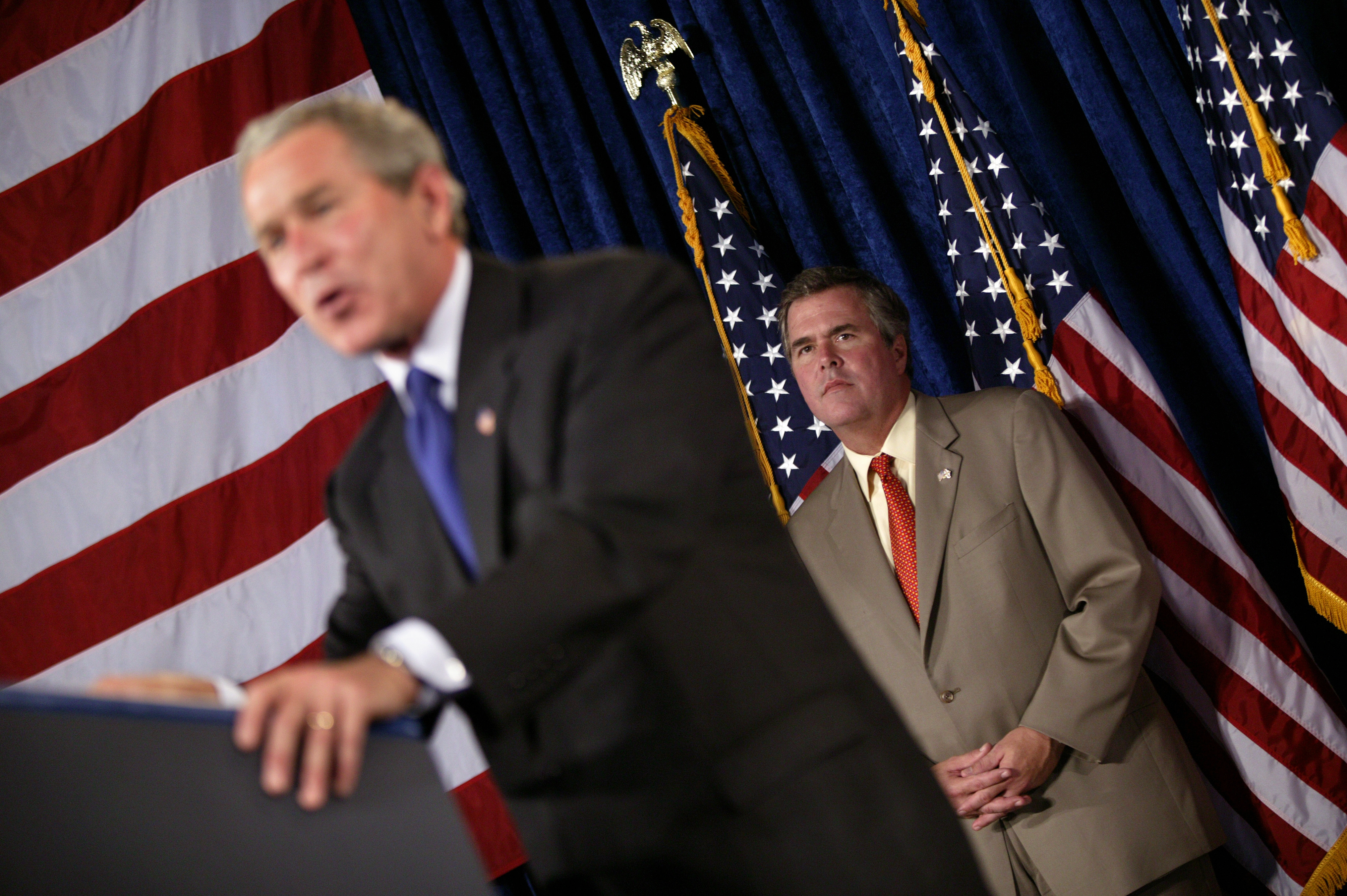Why did the conservative base embrace George W. Bush but not Jeb Bush?
The former Florida governor is arguably the more conservative of the two


A free daily email with the biggest news stories of the day – and the best features from TheWeek.com
You are now subscribed
Your newsletter sign-up was successful
Many conservatives, including Breitbart's John Nolte, believe that Republicans only win presidential elections when the base likes the nominee. They liked George W. Bush, but John McCain and Mitt Romney, not so much. And looking ahead to 2016...
Maybe you take issue with the premise, and think Dubya never actually had the base on his side. And indeed, there was some mild push-back against his "compassionate conservative" agenda, and perfunctory campaigns waged from the right by the likes of Alan Keyes and Gary Bauer. But it was John McCain — hardly a base-inspiring conservative stalwart — who presented a much more serous challenge to Bush in the 2000 primaries. So let's take Nolte's premise at face value and ask, why did the base like George W. Bush, but not Jeb Bush?
Dubya surely benefited from following eight years of Bill Clinton. Conservatives were desperate for a winner, and winning covers a multitude of sins. So why doesn't Jeb benefit from the same desperation that should come from eight years of Barack Obama? After all, the one common denominator for Republicans winning a presidential election in the last 25 years seems to be the Bush surname.
The Week
Escape your echo chamber. Get the facts behind the news, plus analysis from multiple perspectives.

Sign up for The Week's Free Newsletters
From our morning news briefing to a weekly Good News Newsletter, get the best of The Week delivered directly to your inbox.
From our morning news briefing to a weekly Good News Newsletter, get the best of The Week delivered directly to your inbox.
You could argue that George W. Bush's actual governing record is to blame. But on the issues that infuriate grassroots conservatives the most, Jeb's positions tack pretty closely to Dubya's 2000 campaign promises. For example, Jeb is for conservative-riling issues like Common Core and immigration reform — but George W. Bush was for "No Child Left Behind" and immigration reform, too.
Here's the thing: It's less about the Bushes than it is about the base. The base today is vastly more different than the base of 2000 than Jeb today is different from George 15 years ago.
As The New York Times' Jonathan Martin recently noted:
The party is different in tone and substance, moving toward a stricter, limited-government brand of conservatism in response to President Obama's liberalism, a change that has generational and ideological dimensions.Now, deviations from orthodoxy on education, health care, immigration and the environment that some Republicans flirted with or embraced during George W. Bush's presidency are as out of vogue on the right as flip phones. [The New York Times]
There are other situational factors, too. Dubya didn't have any serious challenges from his right. Jeb could potentially have to fend off a slew of conservative adversaries, including a few sitting U.S. senators and governors. And of course, many Americans may well believe that two Bushes was fine, but three is too much.
A free daily email with the biggest news stories of the day – and the best features from TheWeek.com
Or maybe it's about personality.
These are all possibilities. But what seems clear is this: The difference in base popularity between the two Bushes has little to do with conservative philosophy, and much more to do with style and their respective situations. George W. got away with his apostasy because he had a Texas swagger and twang, no real conservative opponents, and a much less emboldened base. Jeb, the more cosmopolitan of the two, doesn't get the benefit of the doubt in part because he seems, as one Twitter interlocutor noted, like an "intaleckshuall."
He can't go back in time. But if only Jeb could affect a Southern accent, slap backs, and assign nicknames — that, my friends, would be smart strategery.
Matt K. Lewis is a contributing editor at TheWeek.com and a senior contributor for The Daily Caller. He has written for outlets including GQ Politics, The Guardian, and Politico, and has been cited or quoted by outlets including New York Magazine, the Washington Post, and The New York Times. Matt co-hosts The DMZ on Bloggingheads.TV, and also hosts his own podcast. In 2011, Business Insider listed him as one of the 50 "Pundits You Need To Pay Attention To Between Now And The Election." And in 2012, the American Conservative Union honored Matt as their CPAC "Blogger of the Year." He currently lives in Alexandria, Va.
